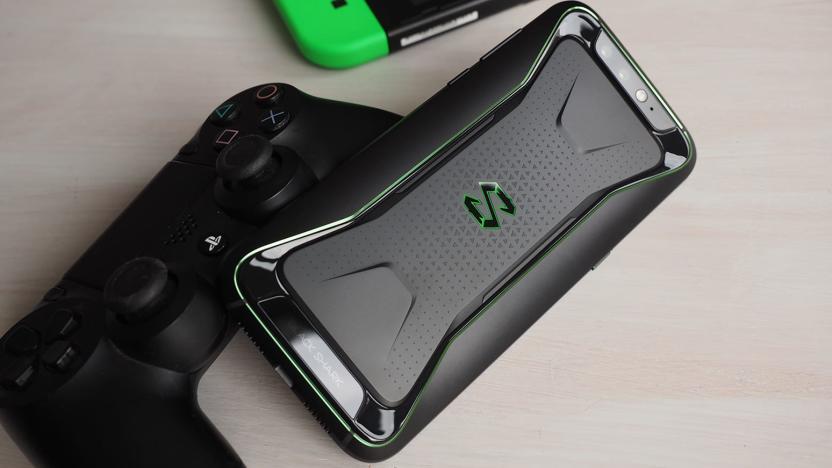gamebench
Latest

The Black Shark looks like a gaming phone, runs like any other
Some of the most popular mobile games have player bases far exceeding those of big-name, AAA console titles. And where simple but addictive puzzlers like Candy Crush Saga used to be the pinnacle, we now have much more elaborate and engaging games like PUBG Mobile and Arena of Valor. Already this year, we've seen a resurgence of devices aimed specifically at the 'mobile-gamers' demographic. In Europe, there's now one more: The Black Shark, which recently went on sale, starting at the introductory price of €469/£409 (roughly $525).

Smartphone chips are about to get better at gaming, Twitter and Netflix
There's been a lot of talk about how phones from certain manufacturers can sense when you're running benchmarking software and will artificially inflate their performance accordingly. It's been a problem for some time now, but the industry appears to be finding its own ways of dealing with the issue. ARM, the outfit that designs the bulk of the smartphone industry's chips, has teamed up with British startup GameBench to make benchmarks not only more honest, but also a lot more understandable.

Benchmarking the new HTC One: less cheating, better performance
There are actually two "Ones" that launched this week. The star attraction is undoubtedly the HTC One, but let's not forget the brand-new Snapdragon 801 running under its hood: a cutting-edge processor that will also power the Sony Xperia Z2 and the Samsung Galaxy S5, but which happens to have reached the market first in HTC's flagship phone. This chip represents a significant upgrade over the Snapdragon 600 in the old One, promising a hat trick of better all-round performance, more fluid gaming and longer battery life, and these are precisely the claims we're about to explore using a combo of benchmarking apps and real-world tests. At the same time, HTC has suddenly decided to come clean on the issue of benchmark cheating, which makes it a bit easier for us to trust what the numbers are telling us.

Which Android phones win at gaming?
A simple kind of happiness reigns in the world of mobile gaming. The app stores are brimming over with four-star ratings; popular titles are making billions of dollars for their creators; and folks on the morning commute seem generally content with what they're playing -- sometimes destroying rows of fruit, sometimes rows of candy. Few of us expect or demand anything deeper on a tablet or smartphone, and surely none of us would be crazy enough to choose our next handset based solely on a criterion as narrow as 3D gaming performance. Right? Well, yes and no. Things certainly get more complicated when you look at the cutting edge -- especially on Android. The industry is pushing the boundaries of what a mobile game can be, what a mobile processor can do and what an Android-based gaming device can look like. And as ambitions escalate, so do the risks. The old nemesis of fragmentation means that certain titles may stutter, or cause excessive battery drain, or fail to run at all, so that those glowing reviews turn into one-star complaints and customers go back to playing it safe. The industry is pushing the boundaries of what a mobile game can be That's why we reckon it's a good time to take stock -- to measure how well some current and older Android devices handle a sample of graphically demanding games. We've got cold, hard numbers to show you, which should help to pinpoint the most future-proofed products. We also have a secondary aim, which is to set a benchmark against which we can judge the next wave of hardware, soon to be announced at Mobile World Congress. Indeed, it's already becoming clear that, from a gaming perspective, smartphones don't always progress in the manner or at the rate that we might expect.

Samsung and HTC phones go head-to-head in an 'uncheatable' benchmark test
Remember the allegation that Samsung cheats at benchmarks? Despite the manufacturer's semi-denials, there's growing evidence to suggest that not only Samsung, but also a number of other Android phone makers engage in some level of chicanery. Usually, it involves programming a device to temporarily ramp up its performance if it detects the launch of a benchmark test, regardless of the consequences for battery life or processor temperature. This results in a higher score on the artificial test, but one that is unrepresentative of what the device could actually achieve if it had to pace itself for a real-world task that lasted for a longer period of time -- such as a 20-minute bout of gaming. So far, so bad. However, a startup called GameBench reckons there's another way. Its founders, who previously worked at chip companies like ARM and MediaTek, claim to have developed an "uncheatable" performance test that can be used to corroborate (or refute) the scores from traditional benchmarking apps, and which can help to rank Android phones and devices according to their true gaming capabilities. Although GameBench's app is still in beta and likely won't be released until the first quarter of next year, it has already collected scores for two devices, the HTC One and the Samsung Galaxy S 4. Ironically, as you're about to see, Samsung may actually have less to fear from this cheat-free test than some of its rivals.


